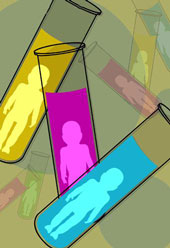 |
| CALLING FOR HELP: Doctors claim that they get at least 50 calls a week from across the country |
Desperate for a child, the 33-year old woman had been to an artificial insemination clinic 10 times in the past three years. Each time, she had returned disappointed. During each visit, she would undergo a medical procedure called intrauterine insemination (IUI). Her doctors would give her a hormone injection to trigger her ovaries to discharge an egg. They would wait until the egg was ready to be fertilised and then gently deposit sperm cells harvested from her husband into her uterus. But it just wasn’t working. After six failed IUI attempts, ideally, she should have switched to a more advanced technique called invitro fertilisation (IVF), in which the egg and sperm cells are made to interact in the laboratory to create a ‘test-tube baby’. But the woman had misconceptions about IVF, and she didn’t get the right advice from her doctors. Time was running out. Until she called a helpline.
A telephone number and an e-mail address can hardly be expected to solve a medical problem. But for thousands of couples across the country, a 24-hour helpline might serve as a first, intermediate, or last step towards tackling or coming to terms with infertility. A team of doctors has set up helplines in Mumbai and New Delhi to offer advice on how to deal with infertility. The helpline also responds to queries via e-mail. When the woman with 10 IUI failures called, she was told to lose no time in opting for the IVF procedure.
Several hundred couples from across India have called or written since the helplines launched operations — last October in Mumbai and a few weeks ago in New Delhi. Doctors who have taken calls on the helplines say they receive about 50 calls each week. “There is a lack of information about infertility and treatment options among even well-educated people,” says Dr Nandita Palshetkar, a consultant gynaecologist in Mumbai who specialises in assisted reproduction technologies (ART) procedures.
Doctors estimate that 10 per cent of married couples fail to have children after trying steadily for a year without contraception. Infertility is believed to affect some 20 million couples in India. The majority may be investigated by neighbourhood gynaecologists. Ultrasound and hormone tests as well as semen analysis can often pinpoint the cause of the problem. Statistics suggest that 80 per cent of infertility can be treated through traditional options such as hormone treatment.
However, some 20 per cent of infertile couples need ART. The standard treatment options usually available from gynaecologists involve manipulating the physiological processes in the man’s or the woman’s body in order for natural conception to occur. But ART involves procedures in which sperm cells from a man or eggs from a woman are extracted and handled outside the body in a laboratory. ART procedures involve sophisticated techniques and demand specialised training. While traditional medical wisdom has held that infertility among women rises after the age of 35, some doctors say medical evidence now indicates that fertility rate drops after 30. “Couples need to understand that, in some cases, infertility can actually be avoided,” says Dr Hrishikesh Pai, an ART specialist. He said a significant proportion of young couples today place high priority on their careers and delay having children. “It’s a sensitive, tricky issue — but if they do want to have children, they need to pursue things in parallel,” Pai said.
Most ART procedures have a success rate of 20 to 30 per cent each cycle — where a cycle is one attempt at achieving conception in a test tube. ART costs Rs 60,000 to Rs 100,000 per cycle. Doctors say patients should understand that if it does not work in three to four cycles, they should consider adoption. “Adoption is a complementary component in any ART clinic,” says Pai.
Doctors on the helpline concede that while they will answer whatever questions they can on telephone or via e-mail, some patients may also be advised to approach them for personal consultations. “Yes, it might act as a way of getting across to new patients,” says Pai. “But we hope it will also help a lot of people who choose not to come to us for consultations, particularly those from outside Mumbai or Delhi. The important thing is that they get the right medical advice no matter where they are,” says Pai.
One objective of the helplines would be to get couples to seek medical help for infertility early. “A small proportion of infertility remains unexplained — when all medical tests are normal,” says ART specialist Nandita Palshetkar. “In such cases, couples should seek medical help early instead of waiting so long for natural conception to occur,” she says. She recounts a call she received from a 37-year-old woman who had waited 14 years. “A wait of two or three years is fine, but not longer. ART success rates drop with age,” Palshetkar said.
The helplines have received all kinds of queries. Most callers have already been to their local doctors and are seeking additional information or fresh opinions. But one couple called in recently to complain that six months after trying, the woman was yet to conceive. “We just told them to hold on,” says Palshetkar.
For further information:
Infertility Helpline (New Delhi): 011-3344 7337, 3318 7858, 3342 8177.
Mumbai: (0)9820224000, (0)9892211112;
E-mail: infertilityhelp@yahoo.com; ivfbabies@hotmail.com.










